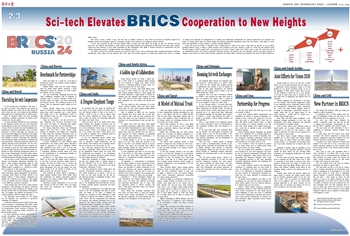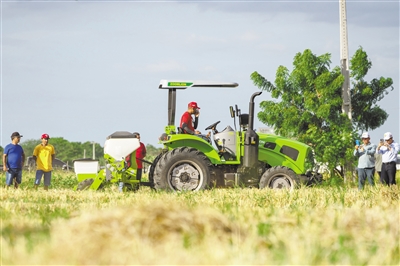
 |
As the proverb goes, "Friendship is like wine — the older, the better." This sentiment was echoed by Brazilian President Luiz Inácio Lula da Silva during his visit to China last year, as he praised the Sino-Brazilian relationship and the cooperation with the BRICS nations.
Since its inception, BRICS has seen flourishing development, providing momentum for Brazil's socioeconomic and sci-tech growth.
As China and Brazil celebrated the 50th anniversary of their diplomatic relations this year, their long-standing partnership in science and technology has taken center stage. The two countries have jointly established intergovernmental cooperation mechanisms, such as the Subcommittee on Science, Technology, and Innovation under the China-Brazil High-level Coordination and Cooperation Committee (COSBAN), and the China-Brazil High-level Dialogue on Science, Technology and Innovation. These frameworks support collaboration in building joint research platforms, conducting cooperative studies and facilitating exchanges among researchers. The two countries have built 10 joint laboratories and research centers, focusing on areas like clean energy, nanotechnology, and rail transit. Moreover, they have seen fruitful cooperation in space technology, fundamental sciences, climate change, biotechnology, and public health, demonstrating a shared commitment to advancing knowledge and addressing global challenges through joint efforts.
Over the past 36 years, China-Brazil aerospace cooperation has flourished, significantly benefiting both nations. Their aerospace partnership began in 1988 with the China-Brazil Earth Resources Satellite (CBERS) program, recognized as a "milestone in South-South cooperation in high technology."
This initiative uses satellite technology for environmental monitoring, disaster management, and agricultural planning. Clezio Marcos De Nardin, director of the Brazilian Institute of Space Research, emphasized the benefits this cooperation has brought to their people. To date, six satellites have been developed, with CBERS-04 and CBERS-04A currently in operation.
These satellites play crucial roles in water resource management, urban planning, and disaster monitoring, and during the severe flooding in Rio Grande do Sul this year, notably aided the government's rebuilding efforts. The program also supports the protection of the Amazon rainforests, called the "lungs of the earth."
The agricultural trade between the two nations has also expanded, and cooperation in agricultural technology has deepened.
In Brazil's northeastern town of Apodi, modern agricultural machinery is transforming small farms, thanks to the China-Brazil Agricultural Mechanization Cooperation Demonstration Project launched in February. The project focuses on precision sowing, fertilization, and drone-based pest control.
As major agricultural countries emphasizing sustainable development, China and Brazil are engaged in deep dialogue on enhancing the resilience of agricultural supply chains and promoting climate-smart agriculture. Last April, the two countries released a joint statement to expand cooperation in sustainable and low-carbon agriculture and digital agriculture.


 Next
Next




